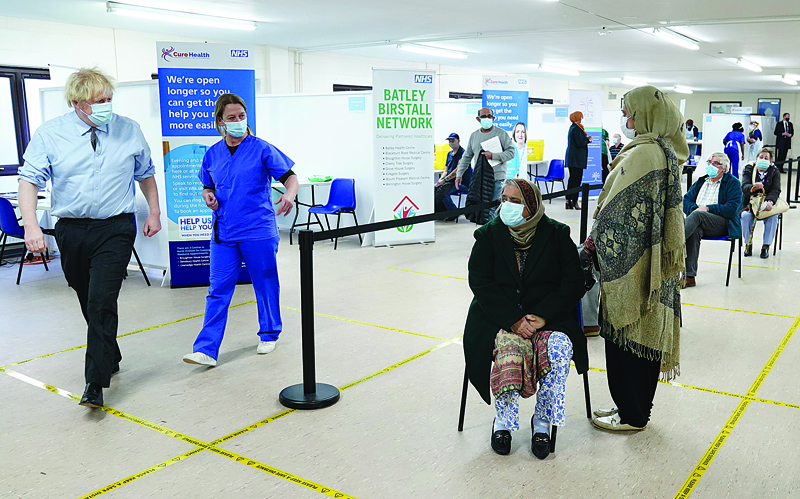 LONDON: Britain's Prime Minister Boris Johnson (left) walks past members of the public waiting to receive their vaccine as he visits a coronavirus COVID-19 vaccination center, the Al-Hikmah Vaccination Centre in Batley, northern England yesterday.-AFP
LONDON: Britain's Prime Minister Boris Johnson (left) walks past members of the public waiting to receive their vaccine as he visits a coronavirus COVID-19 vaccination center, the Al-Hikmah Vaccination Centre in Batley, northern England yesterday.-AFPBRUSSELS: European Union's efforts to secure COVID-19 vaccines received a much-needed boost after AstraZeneca promised to increase deliveries, while US Republicans were set to meet President Joe Biden to try and build bipartisan support for a huge national relief plan. BioNTech and Pfizer said yesterday they will ramp up their coronavirus vaccine deliveries to the European Union, pledging to send up to 75 million extra doses to the bloc in the spring.
"Pfizer and BioNTech continue to work toward increased deliveries beginning the week of February 15, ensuring we will supply the full quantity of vaccine doses in the first quarter we contractually committed to and up to an additional 75 million doses to the European Union in the second quarter," they said in a statement. The EU has ordered a total of 600 million doses of their Comirnaty vaccine.
The statement came hours ahead of a national conference called by Chancellor Angela Merkel with vaccine manufacturers amid growing anger over the bloc's sluggish inoculation campaign. BioNTech and Pfizer, which will take part in the meeting, said that improvements in their production capabilities would allow them to speed up supplies.
British-Swedish firm AstraZeneca will increase shipments of its vaccine to the EU by 30 percent, said European Commission chief Ursula von der Leyen Sunday, as the bloc struggles to get its mass inoculation program up and running. AstraZeneca had had previously said it could deliver only a quarter of the doses originally promised to Brussels for the first quarter of the year, sparking outrage and accusations it was giving preferential treatment to Britain.
In the US, ten Republican senators were set to meet Biden to present an alternative to his $1.3 trillion relief plan, arguing that a scaled-down approach could garner the bipartisan support he has said he seeks. Senator Susan Collins, a moderate Republican from Maine, said that she had joined the group to present their own $600 billion package to help steer the world's worst-hit country out of historic health and economic crises.
The virus is known to have infected more than 102 million people so far-with over 2.2 million deaths-and countries are scrambling to vaccinate their populations and lift economy-crippling restrictions. Kazakhstan began its campaign yesterday, with top health officials receiving Russia's Sputnik V vaccine in front of reporters.
Deputy health minister Erlan Kiyasov said he didn't "feel any sort of discomfort" after receiving a shot. Also getting vaccinated in front of the cameras was the leader of the Maldives, as the tropical archipelago began its own rollout using doses donated from India. South Africa, meanwhile, was poised to take possession of a first shipment of 20 million AstraZeneca/Oxford doses. Africa has fallen behind in the global vaccine scramble as wealthier nations have been accused of bulk-buying doses directly from manufacturers.
UK hero hospitalized
Volunteers lined up in a London skyscraper, waiting to be taught how to administer the vaccine after the government called for 30,000 individuals to help administer the Pfizer-BioNTech and AstraZeneca doses. "When I had the opportunity to do something that made a difference, I definitely wanted to jump at it," documentary director Mike Day told AFP at Canary Wharf in east London. More than 8.9 million people have already received a first dose of the vaccine in the United Kingdom, the first Western country to launch a massive vaccination campaign in early December.
However, Britain is one of the hardest hit by the pandemic, and on Sunday the family of Captain Tom Moore-a 100-year-old former soldier who won hearts with a Covid-19 fundraising drive-was hospitalized with the virus. Countries elsewhere in Europe were tightening restrictions as caseloads keep climbing. A two-week ban on foreign travel took effect in Portugal on Sunday as the country grapples a surge in cases, further devastating the already-battered tourism industry. European budget carrier Ryanair also announced a 306-million-euro ($371 million) third-quarter net loss on virus fallout yesterday, and forecast an annual loss of between 850 and 950 million euros.
Back to school
In India, students in the southern tech hub of Hyderabad trooped into class for the first time in 10 months, with temperature tests in the playground before taking their seats in a classroom with "Welcome Back" chalked on the blackboard. Top indie film festival Sundance got underway online Sunday, with all 72 feature films making their premiere via streaming-a world away from the usual whirl of flashy, red-carpet screenings and after-parties high in the Utah mountains.
"Why make this movie?" said "House of Cards" star Robin Wright said ahead of the screening of her directorial debut "Land", a tale of solitude and isolation. "It's a reminder that we do need each other." "We do face adversity, and it's generally the compassion and kindness of another person that gets us through that difficult time... I think we all can resonate with that right now." - AFP










